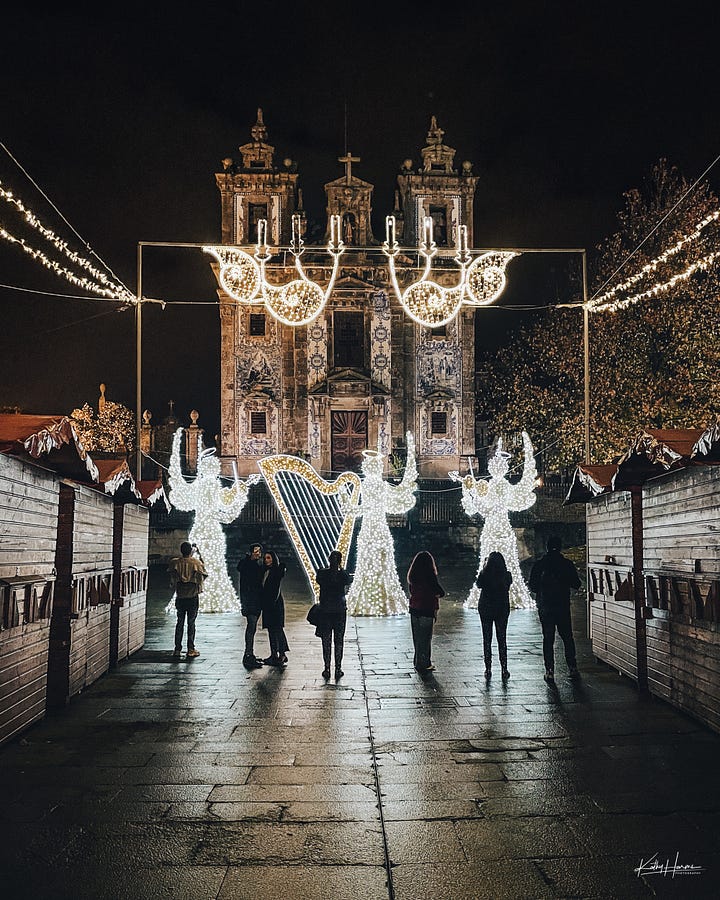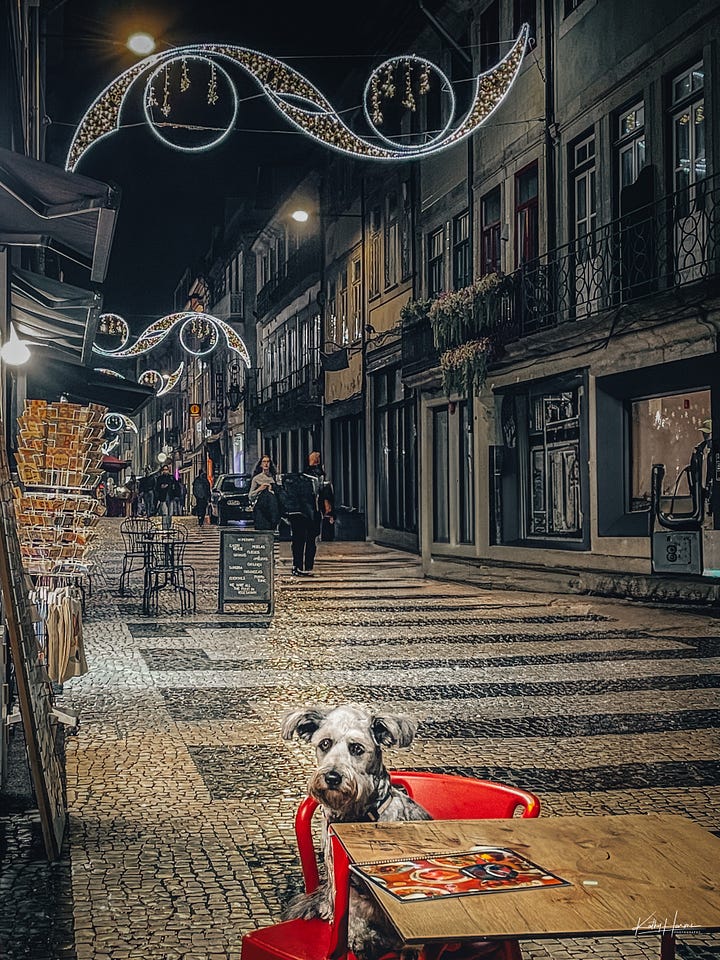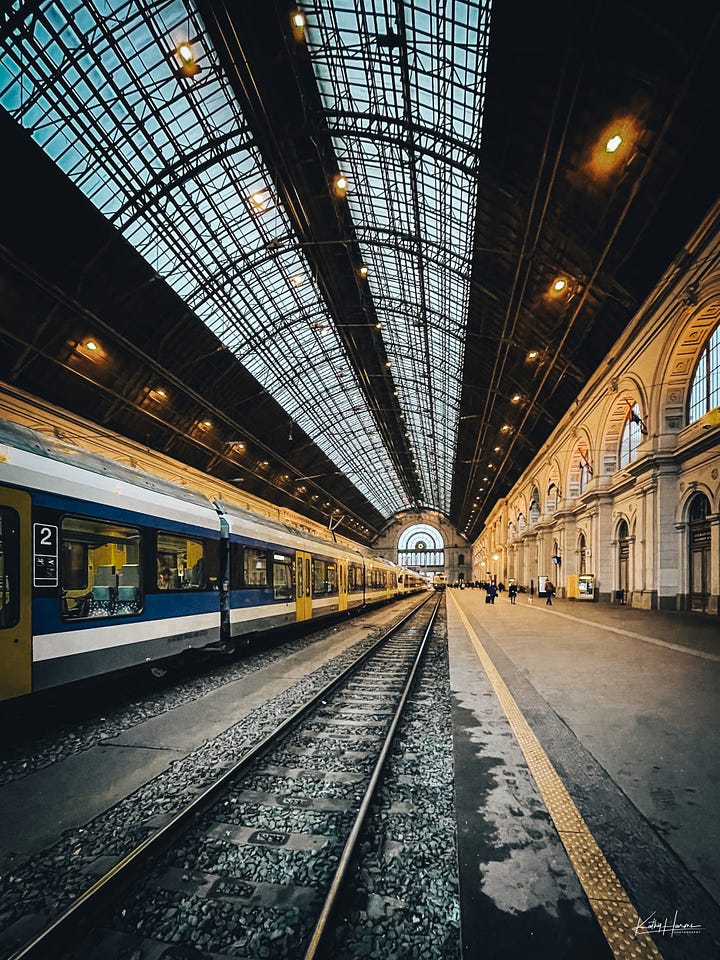Welcome to “The Journey”, a newsletter from my little corner of the internet!
In this bi-weekly newsletter, I share experiences and observations from day-to-day life and the occasional broader “life lesson”, bigger projects I’m working on, and details I think you might find interesting about my recent photography or writing efforts.
“The Journey” is a reader-supported publication, and arrives in your inbox every second Sunday for free! And if you wish, you can opt in for a paid subscription ($5CAD/month or $50CAD/year), and you will receive a surprise item in the mail as a “thank you”!
Life at Large
Last week I came across a post on Substack that caught my attention, I’ve linked it here.
Gregory Garretson posed the question to his readers, “Are you one of the few Americans who really could move to Europe?” This caught my eye, not because I’m American (I’m not), or because I’m planning to move to Europe (I already have), but because he went on to ask 10 more great questions, and an idea formed.
While clearly intended for those in the early planning stages of a big move, his questions gave me pause to reflect back on our experience thus far in Porto, and adjusting to living in a new country. I thought I’d share those reflections with you, by answering the questions Garretson offered. I know this is the time of year for “the year in review” type reflections, but this goes back further than the last year, and digs a bit deeper than simply “what we did this last year,” so here goes.
Garretson proposed “a bit of serious self-reflection about whether you are the right sort of person to make such a momentous change in your life.”
He posed the following 10 questions:
Are you a Security Person or a Discovery person
Do you have the patience and perseverance necessary to deal with setbacks?
Do you have the emotional wherewithal and support you will need?
Are you prepared to live far away from your family and friends?
Are you prepared to adopt a totally different lifestyle?
Are you prepared to accept a lower level of comfort and convenience?
Are you prepared to make the massive effort required to learn a new language?
Are you sufficiently familiar with the country you plan to move to?
Do you see a realistic path toward long-term residency?
Do you have a reasonable financial safety net and a Plan B?
Bonus question: Is your partner fully on board with this? Are you Sure?
Looking back, I thought these were pretty good questions, and each one is relevant in our experience. I’ll go through them in order with my reflections:
Are you a Security Person or a Discovery person
The gist of this question was about whether you prefer things to be predictable and “safe”, or do you enjoy new experiences. I can answer that one with an solid '“I’m both”. There are times I become a creature of habit, I just want my comfy slippers, my favourite coffee mug, and the day to unfold in a predicable way. Other days I’m up for anything. If I consider this more broadly, in my life I have moved a lot. Sometimes to a new home in the same town, sometimes to a new town or city. The new location has always come to feel familiar quite quickly. Humans are pretty good at that - adapting. Things that initially feel different and special, or even different and terrible, slowly just become normal.
As I pondered this question, my mind went to an idea I recently read about, “primal world beliefs”. Primal world beliefs are your views of how the world “generally” is - safe or dangerous, enticing or dull, alive or mechanistic. On one end of the continuum, there are people who’s primal belief is the world is generally “bad, and on the other end, the world is generally “good”. How does this play out in day to day life? On an extreme level, everything unknown or new could be assumed to be bad, if you hold “the world is bad” primal beliefs, or you could naively put yourself in harm’s way if you believe everything in the world is good. Fortunately, most of us sit somewhere in the middle of those extremes.
There is a survey you can take if you are interested to see where you sit on the continuum. Here are my results, on a scale of 0-5:
In general, I have an overall belief that the world is good. I’m theorizing here, but I think that belief helps me adjust to new circumstances and ways of life. My attention doesn’t immediately go to a negative frame when things are new or different. That’s bound to ease an international move!
Does it mean I’m oblivious to setbacks? No. Keep reading for those sagas.
Do you have the patience and perseverance necessary to deal with setbacks?
This one was a solid “it depends”. If I had asked myself this question before we moved, I might have answered with a “no.” Now, a year and a half in, and after several setbacks, I can say “yes.” What changed?
Back in Canada, still in a stressful full time job and planning a big move, I think had one nerve left, and it was easy for setbacks to trample all over that poor, frayed nerve. Now, with my mind focused on completely different things, setbacks just don’t seem so big - and we have had a few, so I feel qualified to speak to this point!
We have had three setbacks that I would say were substantial enough to give us pause. The first was some of Michal’s online work dried up very unexpectedly, and left him with a bit of a worrying dry spell. His time has slowly filled with new opportunities, but the initial event was an unsettling surprise.
I had a similar financial surprise. A few years ago, before leaving Canada, I did a consultation with my pension company. The advisor I worked with told me that I was eligible for a reduced pension at 50 years of age, as part of an early pension scheme for first responders in Canada. We ran the numbers, so I would know how the reduced pension would impact me if I took the option. I decided it was worthwhile to start drawing it out at age 50, and the advisor gave me instructions of how to do so. Michal and I added my pension into our financial plans.
Fast forward to my 50th birthday, and my application for my pension. A different advisor told me my part time service as a paramedic, although it counts as pensionable service, is now classed as “administrative” and is ineligible to be considered toward years of service for the early pension scheme. Obviously I appealed the decision, pursued the classification issue with my former employer, etc. No dice. No pension until 55. That’s 5 years of income I need to find somewhere else. Bummer. It didn’t feel like a complete disaster, just a challenge to sort through, but it does add a squeeze to our finances that we didn’t expect.
The final setback we have faced is with the new apartment we are buying. We have bought (read, mostly paid for), an apartment that is still under construction. When we bought in August 2023, the completion date was said to be March/April 2024, with a move in date of June/July 2024. The contract documents said the move in date was September 2024, the developer assured us that was just to give them a cushion for getting all the required permits of occupancy. They were expecting to be finished in the spring.
Well, they are still expecting to be finished in the spring - the spring of 2025. The construction is not complete. This isn’t a HUGE deal, we are renting an apartment in the same neighbourhood, and can keep a close eye on the progress with the new building. We didn’t expect to have paid for a new home AND be paying rent for another year as well, particularly in light of the other financial surprises. We are grateful for the furnished apartment we are living in, but it isn’t our stuff, our furniture, our bed, our cookware. We are eager to set up our own home, together. Ah well.
Do you have the emotional wherewithal and support you will need?
This is one question I can answer with a resounding “YES!” Michal is obviously my main source of support, and we pick our way through setbacks together. I also have family and friends who are only a call away, and increasingly, we have friends here in Porto who have become part of our support network.
Are you prepared to live far away from your family and friends?
I’m from Canada - I’m used to everything being “far away”!
Seriously, though, since 1999, I have always lived at least 8 hours away from my family, this isn’t much farther. To visit them is now a gruelling flight, rather than a gruelling drive. We have managed two trips back to Canada over the last year, and I was able to stay with my parents on both occasions. I have been able to stay and visit for much longer than I was able in the past, as I don’t have to rush back to work.
This move has also brought us physically closer to Michal’s family, and some of my extended family.
Are you prepared to adopt a totally different lifestyle?
Not only were we prepared, we were keenly seeking out a different lifestyle, and we 90% love the new pace of life here in Portugal. Everything, and almost everyone, is more relaxed. Things take the time they take (including completing construction projects, and that is the 10% we don’t love). Businesses close over lunch, and staff often leave together to go enjoy a sit-down meal in a cafe. People calmly wait for their number to be called when seeking services. They buy their groceries day by day at the grocery store in their neighbourhood. We do the same in order to fit into the flow of life around us, and I believe it helps us stay more present to the moment.
Are you prepared to accept a lower level of comfort and convenience?
We didn’t really know what this might mean, prior to moving here. We have some great examples in this area, starting with the first day we arrived. We had booked a 6 month rental of an apartment to get us through the first months of being here. In the photos, and the description, it was a 3 bedroom, 2.5 bathroom apartment. The owner met us outside the apartment, and looked dismayed that we each had a large suitcase, and a small one. That was the first clue that something was amiss. He said he hadn’t expected us to have so much stuff. Having booked the apartment for a 6 month stay, we didn’t think our belongings were too excessive. Into the apartment we went. It became immediately clear why he was concerned about our suitcases - the place was so small. “Technically” it could be called 3 bedroom, if you counted the mattress that was shoehorned into a modestly sized closet. Overall, it was far less than what the photos had portrayed, or the description implied. In a hurried and exhausted discussion, Michal and I decided to stay the night and decide what to do in the morning. Ultimately, we decided to stay and tough it out, but life was not easy in what we came to refer to as “the dollhouse”. The apartment we are renting now is MUCH more spacious, but not without it’s quirks. There is an abandoned apartment above us, and an abandoned building beside us, and they both leak into our apartment. Our landlady is lovely, and does what she can to help, but ultimately leaking buildings are very common in Portugal, and there are limited ways to hold the owners of the abandoned buildings accountable for the property damage they cause to adjacent buildings.
There are other issues that I hear people complain about, but we mostly see them as differences, not inconveniences, are:
Clothes dryers are uncommon, most people hang their laundry to dry
Kitchens are much smaller than in North America.
Exhaust fans in bathrooms are not a given, humidity and mould are common without dehumidifiers
Overall, things that could be considered an inconvenience to some, are some of the things that we really enjoy, like the lack of pre-prepared foods at the grocery store. We have really been enjoying preparing our meals from scratch. That may be because we have the time, but I think it’s also part of the “slowing down allows us to be more present” element I talked about above.
Are you prepared to make the massive effort required to learn a new language?
I talk about this one quite a bit. We are struggling to learn Portuguese. On one hand, everyone assures us it’s a difficult language, on the other hand, there is a lot more we could do to improve more quickly. Can we get by in English? Yes. Will we integrate into our new home without learning Portuguese? No. It needs to be done.
Are you sufficiently familiar with the country you plan to move to?
I think we did enough research to know what we were getting into, and from a process perspective, there were no big surprises. We understand the basics of the government structure, the municipal structures, the demographics, the economy, etc of Portugal. Everything else can be discovered along the way.
Do you see a realistic path toward long-term residency?
Yes, it’s a clear process, and made somewhat more simple by the fact that Michal is already an EU citizen. The path is clear, we just need to pass the Portuguese language exam in 4 years!
Do you have a reasonable financial safety net and a Plan B?
Our financial plan has already been tested, and yes, we do have a financial safety net. As far as a Plan B, at the rate conflicts and politics are evolving globally right now, I think our Plan B is going to have to be fairly fluid. I suspect a lot of people are in that position.
Bonus question: Is your partner fully on board with this? Are you Sure?
Of all the questions, this one is the one I’m most sure of! Michal and I had been planning this move for some time before we were actually able to book the flights. The pandemic happened and delayed us by a year. By the time we could actually move, we were SO ready for it!
As time passes, we talk regularly about our experiences with how it’s going, and what our next steps might be. I’m very grateful for the open lines of communication about the big stuff (and the small stuff).
Overall, I would say our move to Porto has been very positive, and we would do it again in a heartbeat. There is so much more to say in response to each of the questions above, but I think that is for another day.
Projects and Events
There has been a LOT going on over the last two weeks, so much so, I decide to update the “Projects” section of this newsletter to “Projects and Events”. It makes it easier for me to decide where to put the details of everything that is going on these days!
First of all, the Cluster Photography and Print Fair has a new venue, and a new date! It’s now being held April 8-14th at “Curtain Call” in Shoreditch, London. It was super to meet several of the other exhibitors in November when we were in London, as well as Emma and Alexandra, the organizers. I’m very much looking forward to seeing everyone again in April, as the event finally comes to fruition. I’ll update details as we get closer to the date.
Another big thing that happened recently was the episode of the “Bookable Space” podcast, where I talked to host Yvonne Battle-Felton about “Resilience in the Rubble: A True Tale of Aid and Survival in Kashmir” released! You can listen to the episode here. It was my first experience being a guest on a podcast, and Yvonne made it very smooth and comfortable. It was a lot of fun, and something I would enjoy doing again.
This weekend I am joining several of my writer friends as we participate in a Christmas Market. We will have a table where we sell our books and do signings. I’m very much looking forward to it! If you are in Porto, here are the details:
I’m also making good progress on my main projects - writing the stories of my parents before they were my parents! Mom’s story is rolling along. We released a chapter last Sunday, and there are two more that are almost ready. If you have not been receiving the chapters as they release, you can find the latest chapter here. At the pace we are going, we should have the last chapter published by the end of February, or possibly March.
I have loosely started to work on Dad’s story as well. We have done several interviews, and I have started building the timeline of events. I think it should be possible to have it follow a similar format to Mom’s. In the end, I would like to have two +/- 50k word books as a set for family, friends, and anyone else who is interested in the stories of a nurse and a pilot!
Each story covers the span from birth to marriage. I thought that would be a good place to end the stories, as a new adventure began. Little did I know, Mom had started writing the story of the early years of their marriage, when they moved to Southbank, BC, and started a small farm. She is writing an epilogue that tells about those years, and we will use it for both books.
Let me say, this has been a surprising project, in many ways!
Writing
With the projects above on the go, as well as writing this newsletter, and the various descriptions/statements/applications that are needed for both writing and photography events, I get many opportunities to consider the process of writing.
That is, the process as it pertains to me and my motivation, inspiration, and productivity.
Although for the most part I set my own goals and deadlines these days, I do often have external deadlines for submitting bios, summaries of work, or applications for opportunities. Sometimes I find myself bumping into some of the same blocks I used to experience in a structured work environment, and interestingly, the same “work arounds” get me moving again. The most useful tool I use to break through a block, particularly when the block is related to administrative writing, is to break the task down into the smallest chunks I can, and turn those chunks into a checklist. I need to write an artist’s statement for a photograph I’m submitting to a exhibition or competition? No problem, what are the elements of an artist’s statement?
There is a lot of wiggle room in these elements but here are three that are fairly universally mentioned:
Summary of the overall idea of the work
Description of the process/materials used to create the work
How the work reflects the artist’s personal philosophy
There we go. Three easier tasks that I can do in any order. For some reason, breaking even small tasks down into tinier pieces REALLY works for me, especially for the more administrative writing. If only I remembered to try it as soon as I felt myself hesitating, rather than waiting until I have fretted and suffered for days over a seemingly simple task.
When I get a stuck on the big projects, there is always something else I can do while I mull over the sticky bit. If I’m struggling with a chapter in Mom’s story, I can work on a different one, or I can update the project outline, or I can research a detail from the next chapter…there is no end of things to keep working on.
Photography
I haven’t been out with my camera much in the last two weeks, but I did take a few images with my cellphone that I’ll share with you.




These have all been posted on my social media, so apologies if you have already seen them. The one on the left amuses me. It’s a Christmas light installation at Praça da Batalha, near our apartment. I have no idea what the hanging pieces are, but the internet enjoyed the idea that they might depict the angels waiting for their bras to dry.
The middle photo is a portrait of a very good boy who was waiting for his human to pick up dinner. I should mention that you have to click on the images to see them in their proper size, they have been squished into a square to display as a gallery.
The third is a photo of the Keleti Train Station in Budapest, where we picked up and dropped off Michal’s mom and sister last weekend during a whirlwind trip to see Peter Bence in concert. I always love the lines and the “vanishing point” in train stations. With more time, and my “proper” camera, I could have some fun in there!
The final image was taken from my seat at the Mariza concert on Friday at the Superbock arena. It was a treat to listen to her powerful voice, and be part of a large, appreciative audience.
Last Thoughts
Thank you for following along as I share odds and ends from life and creative pursuits, and to those of you who opted in for a paid subscription, THANK YOU! There is a small token of my gratitude on its way to you in the mail for new paid subscribers.
There is also a little “bonus” at the end of this newsletter for paid subscribers, this week it’s a video talking about the way we are experiencing the Christmas spirit here in Porto this year, versus last year.
As always, I love hearing from you - your comments, questions, suggestions, or just a quick hello, they are all very welcome!
Até à próxima! (Until next time!)
Kathy
Keep reading with a 7-day free trial
Subscribe to The Journey to keep reading this post and get 7 days of free access to the full post archives.







